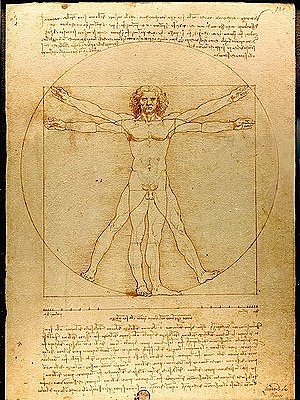Circlings

'The proportions of the human body according to Vitruvius', Leonardo da Vinci, about 1490.
" … a Muddle Ages, arguing over theology."
Our Damned Pandemic seems to have sparked a spike in circular reasoning, that form of thinking Bertram Russel once compared to larceny. We've been swiping answers we want, probably because we so want them to be true, for the nightmare to conclude, that we suddenly find ourselves capable of justifying anything and calling that conclusion perfectly reasonable. Circular solutions seem to prove their premise. Because of This, That AND because of That, This, deduction be damned. An induced solution seems to resolve the troubling problem. Hydroxychloroquine certainly seems to cure this 'flu,' except it isn't a flu and supporting evidence seems rather thin. An act of faith or firm believe gets involved and seems to securely seal the underlying logic. Hopefulness gets the better of us, inviting in a following fresh bout of despair. The meta-cycles of hopefulness and despair seem likewise circular, and we spend some days feeling as if we were circling around a huge drain. ©2020 by David A. Schmaltz - all rights reserved
We set our expectations innocently, stating our objective clearly. No harm and no foul. We might over-anxiously jump to a conclusion then compare that end with our intentions, initially satisfied with imagined results before setting off to employ scientific methods to confirm our promising convictions. We might have easily lost our objectivity when wanting this outcome so much, leaving essential indifference behind. We too easily step into a Necessity Trap, focused upon this one strategy to resolve the growing tragedy. Urgent need might too easily justify any kind of reasoning, however underlying sloppy. Myths get born and fiercely defended. We're properly offended when we encounter a non-subscriber, for we've satisfied our mind and cannot find reasonable justification for starting the search all over again. We fragment.
Serious solutions struggle to compete with circular ones since by all appearances, the difficulty's already been conclusively resolved. Once convinced that we already know what to do, more comprehensive solutions fall out of favor. We feel smarter than the more diligent researchers, who seem to pedantically follow painstaking trials and report inevitable errors. We aced the exam the first time through, or certainly this seems true.
I find it useful, if often frustrating, to imagine that an infinite number of satisfactory solutions exist for every difficulty. None of these might seem particularly apparent at first, when we're simply stuck with the obvious problem, but I employ this potentially useful fiction, if only to reassure myself that I can and ultimately will find some resolution. With a universe of possible options, I'm not then starved for resources, but might well find myself curiously abundantly supplied. I might complicate my search for a solution by stipulating then that I must somehow find the best resolution from this presumed constellation of possibilities, seriously reducing my chances of stumbling upon any one simply good enough for at least partially resolving the situation, best filling in to introduce a certain circularity into my intended solutioning. I might (probably will) quickly find that my conviction that the difficulty needs a comprehensive resolution co-opting discovering some satisfactory semi-solution, one which might well at least stop the bleeding if not immediately resolve the underlying imbalance. Triage could help.
Desperation fuels Circlings. Exhaustion eggs them on. An urgent need for early resolution generally prolongs each search. If only we could muster a renewed indifference, but the morgues continue to fill and our need, ever more urgent. Perhaps pandemics must become a muddle. Had we not jumped to early easy conclusions, confusion might not have ever reigned, and the mythos not have ever emerged, but then we might have successfully averted the pandemic. Once we're immersed within it, more sanguine and patient forms of logic flee. Because it's hard, the easy become increasingly attractive. A simple pill, a reinforced belief, a benevolent God, any of these based strategies seem amply attractive. We enter a Middle Ages, a Muddle Ages, arguing over theology, discounting once-proven methodology, employing Circlings again.


